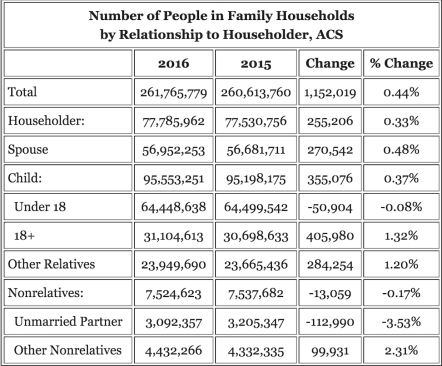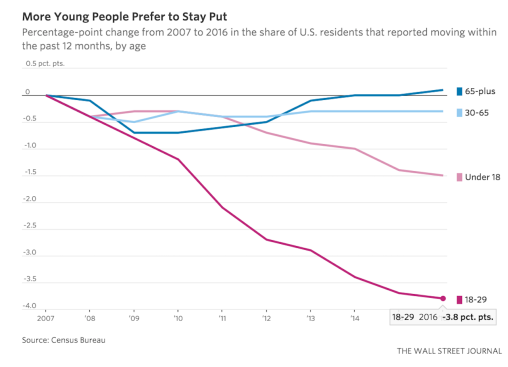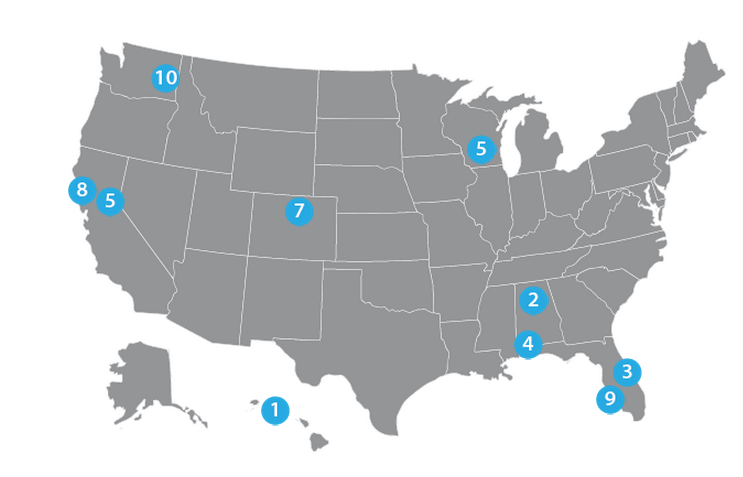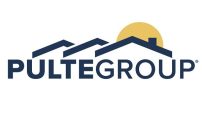The economy’s chugging along, jobs creation is doing what it ought to be doing clocking in at a net 2 million-plus over 2016 for the year so far, and household incomes are on the rise, with more of the same expected.
So, why are household formations–especially among younger adults–stuck in neutral, going nowhere? It’s those young adults’ virtuous circle of consumer behavior–moving out into their own places and equipping them for everyday work-and-play living–everyone’s counting on as the engine of good times to come.
Between 1.3 and 1.5 new jobs in a market normally tip towards a home purchase, but the fact is, many of these new job creations are not even triggering a move-out of mom-and-dad’s house.
Here’s housing analyst Thomas Lawler’s observation on Millennial malaise in the latest Census American Community Survey data release on Bill McBride’s Calculated Risk site.

Source: Calculated Risk
For “young” adults (18-34 years old), the % of young adults living with parents increased to 34.25% in 2016 from 34.11% in 2015, while the % of young adults living with other relatives rose to 13.30% in 2016 from 13.20% in 2015.The % of young adults who were either (1) a householder, (2) the spouse of a household, or (3) the unmarried partner of a householder declined to 32.95% in 2016 from 33.46% in 2015.
In all, 126.2 million households for 2017 represent a niggly 0.3% increase over 2016’s total, the slowest household formation growth rate in eight-plus years. New Strategist Press editorial director Cheryl Russell notes that since 2007, the number of households headed by 25-to-34-year-olds has increased by just 3.5% versus an 8.8% overall gain. That’s a lot of living in mom and dad’s basement, as well as doubled-tripled-and-quadrupled up together in roommate situations.

Strategically, there’s two take-aways we see as critically important for home builders and residential developers.
One, of course, is that more and more, “non-family” households are becoming an ever more important classification of new households in America. Lawler notes that non-family households with two or more people are the fastest-growing category of household growth in the past year.
These changes in household composition occur at an accelerated rate in more metropolitan urban areas, and will continue to strongly influence the kinds of neighborhoods and product lines, as well as pricing, that will appeal to and succeed with the not-married-with-children household.
The other big take-away from the latest ACS data release is of a tale-of-two Millennial marketplaces, one that continues to spin its wheels in the latter phases of a slow recovery from the Great Recession, and one that is on a more normalized maturation, job, household, family, and homeownership formation track.
This percentage of the Millennial population may be smaller in size than the share still mired in college debt and limited social and economic mobility. But, thanks to the magnitude of the cohort–more than 75 million adults who are moving into their 30s–fundamental demand for all housing types is still healthy and growing. As we’ve noted here, traction for homeownership, and the wherewithal to go for it, is a big force of momentum in the market.



